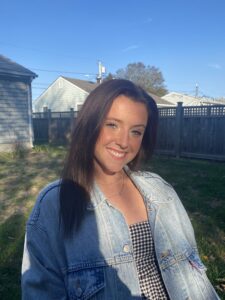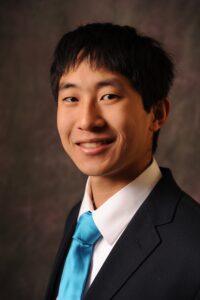Author: NUWC Fellowship Awarded to Two NIUVT Collaborators
Michael Galuska and Craig Tilton were awarded a Naval Undersea Warfare Center (NUWC) Fellowship for the 2022-23 academic year. The Fellowship program provides full tuition and salary for employees seeking advanced degrees. Its purpose is to enhance employees’ technical knowledge in engineering and science. Each employee will participate in this one-year program and attend school on a full-time basis while receiving their salary. The All NUWC Division Newport federal employees, with at least two years of employment, can apply for the program.
Galuska received his B.S. in Mechanical Engineering from the University of Rhode Island in 2019. Starting as an intern at NUWC in 2018, he became a full time employee upon graduation. Galuska is currently working on his Master’s thesis; an investigation of underwater explosive bubble interaction with adjacent structures. His mentor at URI is Dr. Arun Shukla.
Tilton received his B.S. and M.S. in Mechanical Engineering from the University of Rhode Island in 2015 and 2016, respectively. Tilton has worked at NUWC since 2016 and is currently pursuing his Ph.D. in Mechanical Engineering under Dr. Arun Shukla. Tilton’s dissertation includes investigating the fundamental physics governing the collapse of structures in confined environments.
Author: Featured Alumni: Dr. Andrew Finelli, UConn
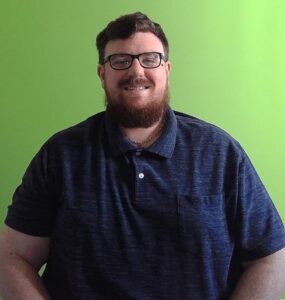
August 10, 2022 | Dr. Andrew Finelli recently graduated from the University of Connecticut with a Ph.D in Estimation and Signal Processing with a focus on Tracking and Navigation. Co-advised by Dr. Peter Willett and Dr. Yaakov Bar-Shalom, Dr. Finelli currently works in the algorithms research and development group at Toyon Research Corporation. “My experience carried over quite directly,” said Dr. Finelli. “My focus is on developing and implementing algorithms to extract information from electrical sensors that may be relevant in a defense scenario.”
While pursuing his Ph.D, Dr. Finelli spent time working on multiple NIUVT research projects. “I worked on a project where the goal was to detect a change in the output of a hydrophone without characterizing the source before or after the change occurred,” explained Dr. Finelli. “It was an interesting application of information theory and communication theory to a place where one might not expect to see the algorithms that were eventually employed. The physics of data collection in an undersea environment provide unique challenges that are simultaneously difficult and extremely rewarding to solve.”
Looking to the future, Dr. Finelli hopes to advance at Toyon and continue research in a wide variety of fields of mathematics, engineering, and computer science. “I’d eventually like to manage a research team, as well as continue to contribute to the field academically through publications and teaching.”
Author: University of Connecticut Offering Oceanographic Science & Technology Certificate
This advanced graduate certificate is designed to train engineers and environmental scientists in Oceanographic Science & Technology. The overall focus is on the environmental factors, design challenges, and corresponding analysis with direct applications to the growing fields of marine technology, ocean engineering, and marine renewable energy. Four courses are included in the certificate curriculum, two in marine sciences and two in engineering. This is a partnership between the School of Engineering and the College of Liberal Arts and Sciences Marine Sciences Department.
The certificate concentration is designed to pair well with the schedules of working professionals. Students complete a 12-credit set of online courses in Marine Sciences, Mechanical Engineering, and Electrical & Computer Engineering. These courses build competency in ocean fluid dynamics, oceanographic data analysis, underwater acoustics, and underwater sensing systems analysis and design.
Students completing the certificate will be able to:
- Understand the scientific programming and statistical, frequency, spatial, and dynamic analysis in an oceanographic context
- Understand the sound and acoustic applications in the ocean
- Describe factors affecting sound propagation in the ocean, simulate beam patterns, implement signal processing modules, and determine sonar detection ranges
- Describe the parameters affecting underwater system performance, master techniques to analyze sensing systems, simulate effects of changing design parameters, and design an underwater system to meet specifications.
For more information, visit https://engineeringcertificates.uconn.edu/oceanographic-science-and-technology/.
Author: UConn Student John Henry Breen Attends NASEC 2021
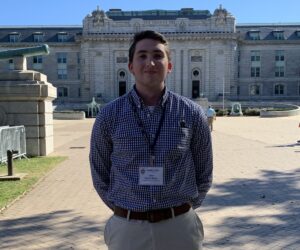
JANUARY 31, 2022 | The 10th Annual Naval Academy Science and Engineering Conference (NASEC) was hosted in-person to discuss topics around data science. The conference provides a forum to bring together the nation’s future Navy and Marine Corps officers with their peers from other colleges and universities across the country. Attendees engage in discussion and research on some of the key scientific and technical challenges facing the nation. This annual conference brings policy makers and science advisors together with university faculty and students to discuss significant science and engineering challenges.
“I had an incredible experience at NASEC 2021,” says Breen. “I was able to meet students from across the country and talk about the capstone projects they have been working on as well as talk to the Midshipmen and learn what it is like to be a student at the Naval Academy. There were many distinguished speakers who spoke on various topics regarding data science and AI. Ethics in AI was a focal point of the conference which was of interest to me because it brought about a perspective that I had never had before.”
“My favorite parts of the conference were the tour of the Naval Academy Museum, dining in Bancroft Hall with all of the Midshipmen, and listening to General John W. Raymond of the United States Space Force.”
Author: Two NIUVT Students Accepted Into NREIP Program
JANUARY 31, 2022 | The Naval Research Enterprise Internship Program (NREIP) places college and university students in Department of Navy (DoN) laboratories where they take part in real Naval research for ten weeks during the summer.
NREIP gives academically talented college students, graduating seniors, and graduate students pursuing STEM careers the opportunity to learn about Naval research and technology while receiving first-class mentoring by top scientists and engineers.
NREIP is a competitive program with over 800 placements in 47 laboratories around the country in which many participants go on to careers within the DoN. Interns are selected based upon academic achievement, personal statements, recommendations, and career and research interests.
NIUVT is happy to announce two of its students were accepted into this program:
Author: Featured Faculty Member: Dr. Lexi Hain, UConn

JANUARY 31, 2022 | Dr. Alexandra Hain, Assistant Research Professor in Structural Engineering at the University of Connecticut, expanded her knowledge of NIUVT through her involvement as a research scientist on a current NIUVT research project. “It is very impactful to work on projects that could make a lasting impact on the defense industry,” said Dr. Hain. “It also makes me consider different applications for my research.”
Dr. Hain’s research focuses on large-scale structural testing and corrosion damage evaluation. “I hope that my research can be the first step in improving current practices,” explained Dr. Hain. “Whether that is by including stakeholders in the research process to ensure the findings are applicable to practice, or doing preliminary work that can be the jumping off point for other engineers and researchers.”
Beyond her structural engineering work, Dr. Hain also leads UConn’s efforts in administering the Navy STEM Coalition to establish a long-term STEM pipeline program in Southeast New England. The program will engage STEM talent K-12 through graduate school in innovative naval-focused activities and hands-on projects through participation from the regional Navy community to provide early and frequent interaction and, ultimately, retention of students from this community.
Author: Featured Undergraduate Student: Max Veilleux, UConn
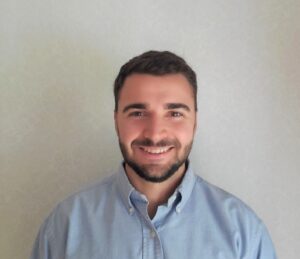
JANUARY 31, 2022 | Max Veilleux is studying Mechanical Engineering with concentrations in Naval Science & Technology as well as Design & Manufacturing at the University of Connecticut. Veilleux is currently an undergraduate student in his senior year at UConn and will be graduating this coming May.
Veilleux learned about the Navy STEM program from his advisor when they told him about the opportunities to participate in during his sophomore year. “I enrolled in the seminar course, now led by Professor Hain, and have loved engaging with the program ever since,” said Veilleux. “Having grown up so close to Long Island Sound, I was always interested in the many renown companies and projects that have come to fruition across Southeastern New England and led the way in developing some of the most advanced naval technologies available to defense and other industries. The opportunity to apply the skills I have developed through academics towards an impactful sector with many compelling real-world applications was something I knew I would enjoy.”
“I hope to work in naval defense or a similar industry focusing on far-reaching engineering projects in a comprehensive role which encompasses aspects of new concept development, design, and analysis,” explained Veilleux. “The Navy STEM program has provided great insights as to what opportunities are currently available for STEM students and new graduates in naval technology industries, what the roles associated with these various opportunities entail, and the trajectory of naval engineering-oriented industries at large.”
“I have really enjoyed working with Professor Hain to re-envision how to communicate the program’s presence and vast benefits to students just like myself,” continued Veilleux. “I always wished I had learned about the program earlier in my college career; with the work we have done, I am able to see a tangible impact in how we are able to spread knowledge of the program to numerous new college students who are intrigued with all it has to offer. With the resources we have and are developing now, it will be possible to give many more interested students exposure to our great Navy STEM program!”
You can learn more about the NIUVT Navy STEM Program at https://navy-stem.uconn.edu/.
Author: Featured Alumni: Matt Olander, General Dynamics Electric Boat
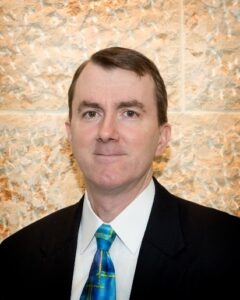
JANUARY 31, 2022 | Matt Olander, Vice President for Design and Engineering at General Dynamics Electric Boat, received a bachelor’s degree in Mechanical Engineering from the University of Connecticut. Olander later attended Renessalaer Polytechnic Institute for his master’s degree in Mechanical Engineering.
Advised by Dr. Jeffers while attending UConn, Olander found himself studying aspects of multiple engineering disciplines during his undergraduate career. “Whether it was some software programming, system modeling, structural analysis or learning about electrical systems and circuits, I was exposed to a broader world of engineering than what I considered at the time to be core mechanical engineering,” explained Olander. “And on reflection, it seems that mechanical engineering can be a bit of a ‘jack of all trades’. This realization came to fruition years later in my career at Electric Boat where I was a technical leader in an integration role. I quickly fell back on my education and was able to better understand the complex relationships and challenges the other engineering disciplines faced. Complex integrated systems require both technical depth and breadth to be optimized at the system level and I believe mechanical engineers have an ability to do either very well.”
Although Olander does less engineering analysis today than he did years ago, Olander still engages with the engineering teams to listen, learn, and when possible, teach. “As a leader in the design and engineering of submarines, I spend much of my time evaluating where we are today and where we need to be in the future,” said Olander. “This pertains to the undersea capabilities we need to understand, the technical expertise to deliver those, and the dynamics of our engineering teams working on them.”
“As the undersea domain continues to grow in prominence, it is growing in complexity as well,” continued Olander. “My goals are to help lead the organization into this generational shift in the undersea – identifying and growing the new skills and tools we will need to deliver on the next generation of capabilities. I pray I have enough humility and wisdom to do that!”
Author: Featured Industry Partner: Dive Technologies
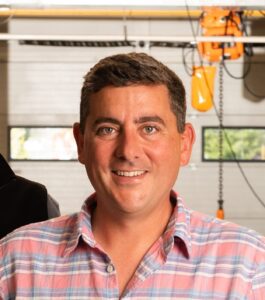
DECEMBER 29, 2021 | Bill Lebo, President and CEO of Dive Technologies, first learned about NIUVT in 2018 through their engagements with URI and NUWC Division Newport. “We were fortunate enough to get involved with NIUVT in the very early days of forming Dive Technologies,” said Lebo.
“This initial engagement, and the numerous connections that were made to local academic institutions, groups within the US Navy, and a diverse group of industry partners, have helped Dive Technologies establish a solid footprint and a large network across coastal New England.,” continued Lebo. “We approached our involvement with NIUVT as a way to broaden our exposure to a wider customer set, like-minded partners, and a hiring pipeline for motivated, maritime-focused personnel.”
Dive Technologies is focused on the development and manufacturing of the next generation of autonomous underwater vehicles (AUVs), vehicles with extended range, advanced autonomy, and large payload capacity. “Being able to tap into the NIUVT network has been instrumental to our success,” explained Lebo. “As a platform manufacturer and systems integrator, we are constantly seeking the best technology to advance our systems and offer the most compelling solutions to our commercial and Navy customers. Being involved with NIUVT has introduced us to a community of undersea vehicle technology experts and researchers with the same goal in mind: solving the hard undersea problems.”
Author: Featured Faculty Member: Dr. Arijit Bose, URI
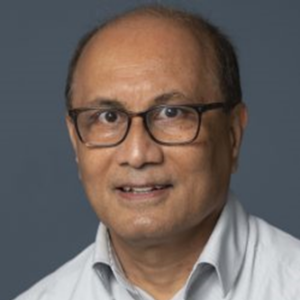
DECEMBER 29, 2021 | Dr. Arijit Bose, Distinguished Engineering Professor of Chemical Engineering, currently serves as the faculty leader for NIUVT’s Underwater Energy Systems research team. “It’s a great opportunity to address some very fundamental issues in science and technology with applications in a very important area,” said Dr. Bose.
Dr. Bose’s NIUVT research focuses on addressing energy storage issues in underwater vehicles. “In particular, we are trying to develop safe, stable, high capacity lithium ion batteries to power unmanned underwater vehicles over much increased distances than currently possible,” explained Dr. Bose. “All unmanned vehicles need power for propulsion, on board sensors, and data transmission. It is important to provide safe and durable power sources so these vehicles can operate at optimum capability.”
Dr. Bose believes there are numerous opportunities for students who graduate from his lab. “The battery area is very active right now, partly because of the major interest in moving to electric vehicles. Students with an energy storage background will have no trouble getting employment in the private sector or in the government.”

